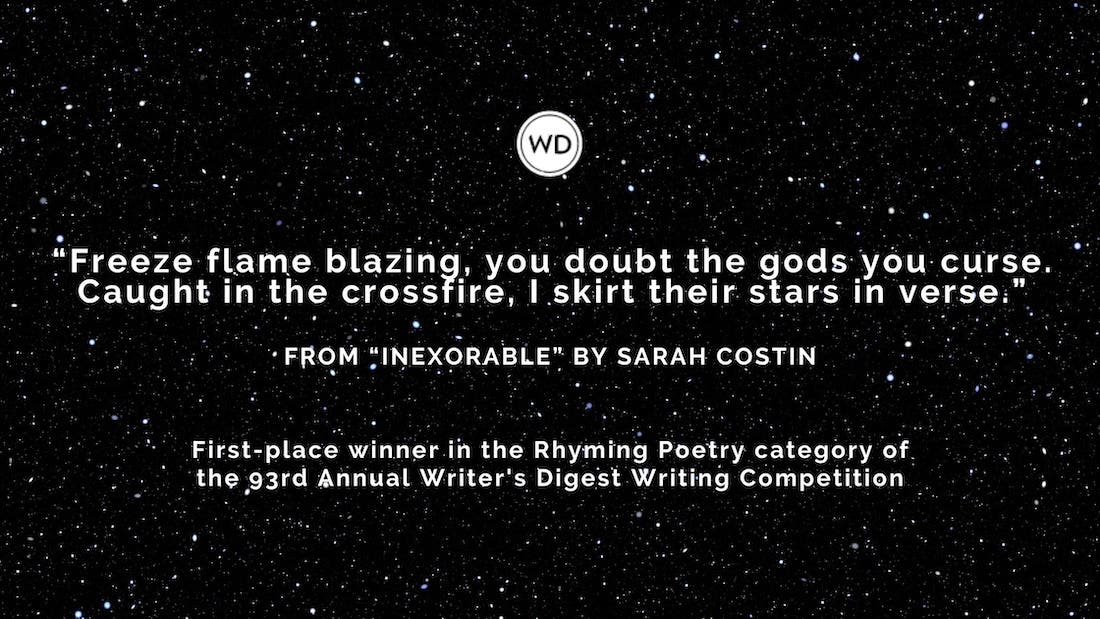Writer’s Digest 90th Annual Competition Genre Short Story First Place Winner: “A Brief Cameo”
Congratulations to D. M. Ullrich, first place winner in the Genre Short Story category of the 90th Annual Writer’s Digest Writing Competition. Here’s his winning story, “A Brief Cameo.”
Congratulations to D. M. Ullrich, first place winner in the Genre Short Story category of the 89th Annual Writer's Digest Writing Competition. Here's his winning story, "A Brief Cameo."
A Brief Cameo
When Demetrius Stone, a confirmed bachelor, came to market one weekend with a wagonload of fresh mackerel and a pale young wisp of a woman clinging to his arm, the gossip spread quickly. And as always, some of it tangled around me.
“He courted you once, didn’t he Marguerite?” asked the baker when I stopped at his stall. A clump of women stood close-by, listening like hungry gulls.
I nodded, hoping that would be the end of the conversation. But of course, it wasn’t.
“Why didn’t you accept him?”
“Because he always smells like fish?” laughed one.
“Because he’s poor?” suggested another.
“I didn’t love him,” I replied with a shrug, though the real answer lay somewhere between their suppositions.
While the baker retrieved my order of honey rolls, I glanced back at Demetrius. The smell of his clothes, like a salty breeze, lingered in my nose even after all these years. Perhaps I’d been too infatuated then to notice something fishy. His face lit with a smile as he kissed the woman above her ear. She tried to pull away, but he held firm. His lips flattened into a scowl and he kissed her again. I shuddered. He hid that side of himself so well. Demetrius was fickle, like a clear sky promising a safe journey only to conjure a tempest hours later. At least I had discovered this side of him before it was too late.
“I bet he got her pregnant,” said the baker, handing me my rolls in a paper bag.
All eyes turned to judge the woman’s slender profile. She swayed as she walked—like a sailor not quite rid of his sea legs. She kept her head down and seemed uncomfortable looking people in the eye. Even animals for sale in the market—chickens and pigs, goats and horses—all screamed, stamped, or tugged at their leads to avoid her. She radiated fear, and they smelled it.
“And I thought the only females he’d ever catch would be in his net,” someone joked.
“Maybe she was,” replied the baker as I paid him.
Excusing myself from their laughter, I drifted down the street to continue shopping. When I passed Demetrius’s stall, I knew I would not escape unnoticed. He took the young woman by the shoulders and led her to me.
“Marguerite, this is Mira.”
“Good to meet you,” I said, holding out my hand.
She crossed her arms tight to her chest, ignoring my gesture. I tried to engage her in small talk—where she was from or how they met—but her replies were as abbreviated as possible. Of course, who knew what Demetrius had told her about me. Sensing her unease and hoping to end the awkwardness, I smiled and wished them both well. I felt her eyes, dark like the depths of the stormy sea, following me as I walked away.
It was a fortnight before we met again. My shop bell rang and I stepped in from the workshop to find Mira standing by the counter, a worn bag clutched before her growing belly. I glanced up at her face, but she wouldn’t meet my gaze. For once, it appeared the gossip was right.
“Demetrius told me you purchase shells,” she said in a whisper.
“Yes,” I replied. “That’s correct.”
After school, children sometimes collected shells by the pocketful and used the money I gave them to buy sweets at the confectioner’s. Occasionally, fishermen brought me shells they found tangled in their nets. None were particularly valuable, but I still found uses for them.
As Mira opened the bag, I didn’t expect much. Demetrius had probably sent her to sell the dregs of some recent catches. Then she began to set the shells on the counter between us—ten tiger shells of various sizes, seven carnelians, and two large curly pinks. These were not leftover net rubbish. These were exquisite!
“Where did you find these?” I asked in amazement.
Mira averted her eyes. “Just out walking.”
Rumor had it Mira did little housework and spent most of her time staring out the window at the sea. Obviously, she did more than just look. After big storms, I often walked there myself, searching for shells tossed up by the tumult of white foam. The walks were a welcome escape, especially when my husband was being difficult. Amidst the salty air, sandpipers, and sea glass, I could clear my head. But, I had never found conches this large.
I took several coins out of the register and handed them to her.
She counted them slowly. “This is more than I expected. What do you do with them?”
It was not tourist season, so most of my inventory was packed away, safe from the soot of winter coal fires. I invited her behind the counter and pulled open a drawer. She gasped.
Inside were a dozen cameos of various sizes and colors, nestled on folds of black velvet. They depicted profiles of women in different poses. Some had flowers in their hair; some a string of pearls around their neck; and still others low cut lace bodices barely covering their breasts.
“I’ve never seen anything so beautiful!” she exclaimed.
I smiled modestly. “Actually, these are my cheapest cameos. Locals buy them mostly as engagement gifts.”
“Engagement?”
Did she not know what that meant? I shrugged off the question. Come to think of it, she wasn’t wearing a cameo. But that was like Demetrius—cheap and unromantic.
“You know, when young lovers commit to marriage. It’s particularly popular to give them on St. Valentine’s feast day.”
Her eyes brightened. She caressed one of the shells she’d placed on the counter. “Yes, I understand.”
Mira’s wonder was infectious and I opened more drawers. Some were full of whole tiger shells carved with ancient ruins or the Lord’s Prayer, the latter of which were purchased by Catholics on pilgrimage to the Vatican. She was like a child exploring a strange new world—even while she carried a child inside her.
“I wish I could do that,” she said, running her fingers over the relief of a water nymph.
“I could teach you if you want.”
The words slipped out of my mouth before I could stop them. Mira seemed so quiet and wistful, interested in nothing but the sea and my cameos—I wanted to encourage her. I glanced at the array of shells she’d sold me. We had taken apprentices on before—had four now in the workshop out back—but they lacked the talent to do more than make copies. Perhaps the carving would come as naturally to her as finding shells did.
“You would? I’m not good at most things.”
Had Demetrius said that? I wondered.
“Well, have you ever carved shells before?”
She shook her head.
“Then, how do you know if you’ve never tried? You can start tomorrow, if you like.”
Mira’s eyes misted. “Okay.”
Not wishing to embarrass her, I returned to the counter and began to close the drawers I’d left ajar. The bell on the front door chimed as Mira opened it.
“Marguerite?” she called, one hand on the knob, the other once more on her belly.
I straightened. “Yes?”
“I’m glad we met.”
*****
True to her word, Mira returned the next day with the same wonder-filled expression on her face. I started her on a piece of flawed conch and spread several tools out before her. I told her they were called bulinos. Each one had a different shaped edge for specialized carving. She worked for days just cutting the outline on the piece—sometimes chewing ginger to ward off morning sickness. Mira learned quickly, but it took her two months to complete her first carving—the plain unadorned profile of a woman.
I did not know then how soon her talent would eclipse my own. Eventually, she would carve whole shells with seascapes—water horses covered in glittering scales, mermaids inhabiting ocean castles, and seals frolicking in windblown waves. Wealthy tourists loved her work and begged for more—but that would come later.
She still strolled the beaches, though less often than before. One or two new shells appeared on my counter each week. More than once, I offered to accompany her. I worried about her safety as her belly grew, but I was also curious. Had she found some secret grotto where shells washed up in abundance? But she always declined. I understood her need for privacy and let the matter drop.
The hardest thing for her to learn was how to break the shells. She winced when she made the fractures, and when she made mistakes. Sometimes the cut went wrong and they shattered. The looks on her face then were awful—as if something inside her was breaking. I taught her to sweep up the pieces and move on.
Finishing went easier. Mira learned how to place completed cameos in a little clay dish filled with olive oil to keep the shells from turning brittle. Once she washed the oil away, I handed her a tiny brush and had her polish the carving until it shone.
As we worked, we talked. Sometimes I told her folk stories I learned as a child about seductive sirens, mischievous saints, or sealskin wearing selkies (which were Mira’s favorites). Sometimes we talked about her unborn child. I told her how I’d been married before, though I left out my miscarriages and resulting barrenness. I didn’t want to scare her. She never mentioned her life before Demetrius.
“Do you love your second husband like you loved your first?” she asked me once.
I shook my head, but sensed half her question had been left unasked.
“You've been married before?”
Her lower lip trembled as she nodded. “He’s lost at sea.”
Ah, he must have been a sailor. She was not alone there. The water cut deep grooves in the surface of the local community, wounding and widowing far too many.
“I’m sorry to hear that,” I told her.
Our conversation lapsed. I glanced at her each time I changed bulinos. She seemed tired and upset. Or was it guilt written in the wrinkles she should have been too young to bear? I took a guess at what was bothering her. “There’s no need to feel guilty, Mira. Most women hide a first love close to their heart even as another man embraces them.”
Mira nodded as she listened, but said nothing.
She went into labor the next day. A month passed before she was well enough to work again. She returned with a bouncing baby, named Naomi, in a basket on her hip.
My husband did not want the infant there—said her crying was distracting. He refused to mind the counter when she was present, which meant I had to. But customers loved to watch Mira work. They complimented her for her talent and cooed over her babe—though some noticed the odd translucent webbing between Naomi’s fingers.
“Just an abnormality,” the local doctor said, “I can remove it when she’s older.”
But, Mira never let him.
*****
Naomi was six when her mother left.
It was a bright day, the end of the harvest season. The whole village held a festival to celebrate. Demetrius stopped by the shop that morning, dressed in his finest clothes. With breath reeking of sour beer, he told me Mira had a headache and would not be in to work.
In all the years I’d known her, Mira had never gotten headaches.
Business was slow that afternoon, so I closed up early. Packing a small basket with food and medicinal herbs, I headed out to check on her. Instead of walking the winding dirt road, I took a short cut along the beach, hoping to pick up a few shells along the way. Instead, I found a herd of seals sunbathing in the sand. I tried to give them a wide berth, but one angry bull still chased me most of the way. Breathless, I arrived at Mira’s door.
I had barely begun to knock when Naomi barreled out of the house and into my arms.
“Auntie Marguerite, we found it. We found it!”
“Found what dear?” I laughed, assuming she’d found some great shell bigger than her imagination.
Mira stepped out onto the porch. My heart skipped a beat.
Hanging from the crook of her arm was a long gray sealskin.
“Honey,” she told her daughter, “Why don’t you go get the shells you collected for Aunt Marguerite.”
Once the little girl had disappeared inside, Mira sat beside me on the bench, the skin draped over her knees.
“You’re a…” I sputtered, the word caught in my throat like a fishbone.
“Selkie,” finished Mira.
I paused to digest this, before asking what had happened.
Mira turned her gaze toward the distant sea. “A storm came upon Demetrius suddenly one day and his boat capsized. I saved him from drowning and hauled him onto the beach, though I had to remove my skin to do it. I only turned my back for a moment to gather firewood—I thought he was unconscious—but he stole my skin. Made up some rotten excuse about how it disappeared… I didn’t know what to do then, and Demetrius was so grateful… I found out later he was lying. He’d locked it away and refused to give it back.”
My stomach churned. I was tempted to reach out and touch the skin, to shed the doubts lingering in my mind. But, Mira had been violated in more ways than one, and I could not—would not—violate her again.
“How did you find it?”
“I’ve known where it was for years now—a metal trunk. But I couldn’t pick the lock and even an axe wouldn’t break it. I got lucky this morning. He was already drunk and left the key behind in the pocket of his work clothes where Naomi found it.”
She took my hand and squeezed it.
“Marguerite, you are the only thing that has made life here bearable. I love Naomi. I really do. But she is a part of this place—a part of Demetrius. And I cannot take her with me. Watch over her, like you watched over me. Will you?”
Tears stung my eyes as Naomi darted up to us, carrying a small basket full of shells. She squirmed between Mira and I, wriggling like a slippery fish to make more room. She handed me shells that were red and orange, spotted and striped. I wondered if she understood what it was she had helped her mother find. The last thing she pulled out was a small conch. Her webbed fingers explored the hidden contours, searching for the invisible carving still hiding in its surface, just as she had seen her mother do.
“I hope you find him,” I told Mira, recalling the bull seal who had chased me to her door. I wondered now if he might be her lost partner.
“Who do you think’s been giving me shells all these years?” she whispered as she stood.
Turning to her daughter, Mira embraced Naomi in a warm hug.
Then, like the touch of a receding tide upon our toes, she was gone.
*****
Demetrius was surprisingly stoic about losing Mira. He let me take Naomi in as an apprentice—for a price of course. My husband fumed about the arrangement. She was too young to be useful, he said, and would get in the way. As if she hadn’t grown up in the shop.
Naomi cried often for her mother, but carving was a distraction. True she was young, excitable, and clumsy—her tiny fingertips were frequently pocked with bits of plaster bandages—but she had an imagination like her mother’s. She grew frustrated easily when she could not pull the image from the shell like she wanted or when her bulinos cut too deep or slid too far. I showed her how to turn errors into intentional cuts. At the end of the day, she swept the shop and sang bits of dark sea lullabies Mira had sung over her cradle.
Demetrius visited on rare occasions, mainly to pick up his cut of her wages. Only once did he try to interfere. There was a thunderstorm that day and customers were scarce. When he opened the door, he brought rain and the parish priest in with him. A bolt of lightning hit the pit of my stomach. They’d come about her hands.
Shaking the water off his hat, the priest stepped up to the counter where Naomi sat carving. He wore crisp black gloves, a matching hat, and seemed too young to have been at his profession long. Glancing about the room, he scratched absently at his white collar.
“See what I mean,” said Demetrius, grabbing Naomi’s right hand and forcing open her webbing, “They need excising—like a sin or circumcision—to make her righteous.”
Naomi’s fingers stiffened as the priest bent to look. Her lower lip puckered into a noiseless cry as she tried without success to tug her hand free. I lunged forward and shoved Demetrius back, placing my own palms protectively on Naomi’s shoulders.
The priest’s eyes shot from her hands to my face. I was about to tell them both to get the-unladylike-expletive out, when I noticed a question dancing unasked behind his blue eyes. His perceptive glance made me tremble.
He knew this was not a deformity.
With a blink, he lowered his gaze to the shell Naomi had just abandoned. It was a cameo barely outlined. The figure of a young woman reclining on a beach, hands to her chest as if undressing. Only instead of legs, she had a tail. Even at Naomi’s young age, I saw hints of Mira’s talent.
“What are you carving?” he asked.
Naomi sniffed as if insulted. “Can’t you tell? It’s a selkie!”
The priest’s right eyebrow arched in surprise. I kept expecting him to condemn someone: me, her, selkies, or the men who assaulted them. But when he spoke again, his words were unexpected.
“How much is this carving?”
My mouth fell open. Demetrius, never one to be lost for words, stole my silence.
“Forget the damn shell. What about her hands!”
The priest straightened to his full height, which even including his hat was still shorter than Demetrius, but the authority in his voice made up the difference. “What about them? They’re the hands of an artist. How can you condemn them?”
Demetrius’ face bloated like a dead fish. He opened his mouth and closed it again, as if shocked to find the man an adversary instead of an ally. Muttering multiple expletives, he stalked back out into the pouring rain. A gust of wind sucked the shop door closed behind him. Three shells fell off the nearest shelf, but the breakage was worth it.
For the first time in what seemed like decades, I could breathe again.
“Naomi, fetch the broom will you?” I told her, prying my white-knuckled fingers off her shoulders so she could rise.
She turned around, face shining with relief, before disappearing into the storeroom.
The priest watched her go, then folded his hands before him as if in prayer. “I’m so sorry. If I’d known what he wanted I wouldn’t have come. But I really would like to purchase her carving, and pay for the broken ones.”
“You don’t have to do that.” I sputtered in surprise.
“Yes, I think I do.”
He wasn’t the first customer to pre-purchase a piece that wasn’t finished (though he was the first to pay for someone else’s sin). Sometimes people special ordered pieces with names or unique imagery. Sometimes they were just jealous when another tourist grabbed the last Poseidon off the shelf before they could. I pulled out a request form, handed him a pencil, and quoted him a price. It was not the full retail value of all the shells, but it was just enough to ease his conscience.
“You know, Naomi’s not finished with her carving,” I added.
“That’s okay, I’m patient.”
His gloved hand held the pencil awkwardly and his writing was the spider-scrawl of an old arthritic, practically illegible. By that time, Naomi had returned and was sweeping the broken shells into a waste bin. I could not understand his reaction. I had seen other priests tell sailors off for spreading tales of sea serpents, mermaids, or dead albatrosses. Why was he being so gracious?
“My mother will love this,” he said, without looking up. “Want to know why?”
Unsure how to respond, I simply shrugged.
He was staring at me again, eyes dark with another unstated question. This time I could not so easily read his conclusions. Setting down the pencil, the man struggled to pull off his left glove. The simple motion was a strain for his stiff fingers. At last, the glove slid free. He set his trembling, naked hand down on the counter. Between each finger was a thick growth of skin resembling dried leather. Old stories I’d repeated to Mira about the children of selkies echoed in my ears like ghosts as the man began his explanation.
“I wanted to be a musician, was talented too—but the organist refused to teach me with webbed fingers. Mother didn’t know any better, so she let the doctor cut them. He took something from me I will never get back. Don’t let them do the same to your daughter.”
Setting down the pencil, he slid the paper back across the counter toward me and struggled to slip on his glove.
I was too stunned by his revelation to argue with his inaccurate assumptions, but Naomi, who had been hanging on our every word, was not so hesitant.
“She’s not my mother, ” said Naomi, crossing her arms. “My mother went home where she belongs and I…”
“Naomi, go dump those shells out in the rubbish can in the workshop, will you?” I interrupted.
The priest watched her go, then smiled at me. “So her mother found it, then? She was lucky. Mine has never found her skin—at least not yet. God bless you for taking care of her daughter. I look forward to seeing the finished shell.”
“I’ll let you know when it’s ready.”
With a tip of his hat, the priest lowered his head and stepped back outside.
I followed his progress through the blurry window, watching as he disappeared into a curtain of rain. I could not shake off the memory of his injured hands and his blessing felt hollow. Today’s battle was won. But, what about tomorrows? Would I always be able to protect Naomi? As she grew older, children would tease her. Young men might refuse to marry her. Could I help her be proud of her body? If she wanted to cut her webbing later, could I stop her? Should I? I didn’t know, and the lack of answers frightened me.
The roof rattling torrents lasted another half hour. Naomi grew restless as the thunder faded. She knew without asking what was coming. As the dark rolling clouds retreated across the waters, she flipped the front sign to closed, I locked the door, and we headed for the beach. At least for a brief spell, I could abandon my anxieties in the future where they belonged.
We were not the only ones out enjoying the sun after the day’s bad weather. Fishermen sat mending nets. Lovers stole kisses in the deep rocky crags. Children flew kites or chased crabs. But Naomi and I walked past them all, watching for a lone seal that often swam beside us in the surf.
The shells she left for us, tangled in seaweed, were perfect for cameos—however small and brief the happiness they brought.








